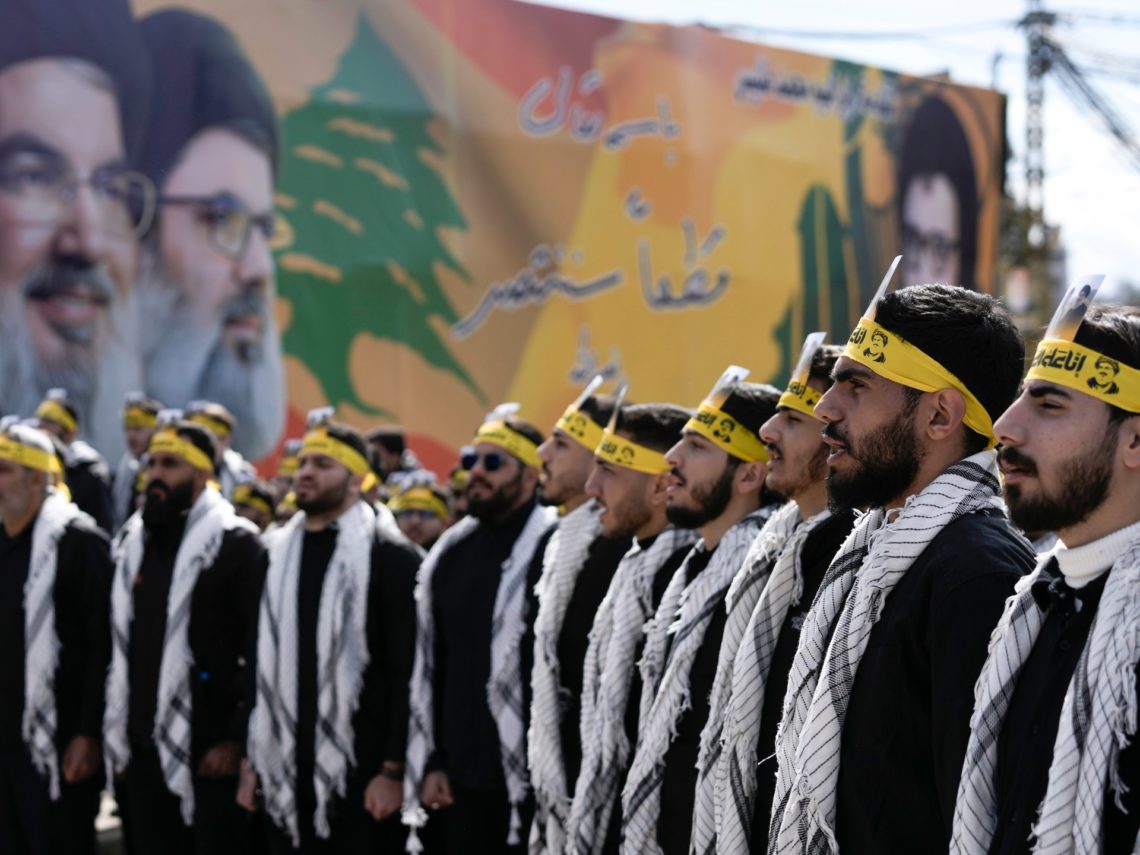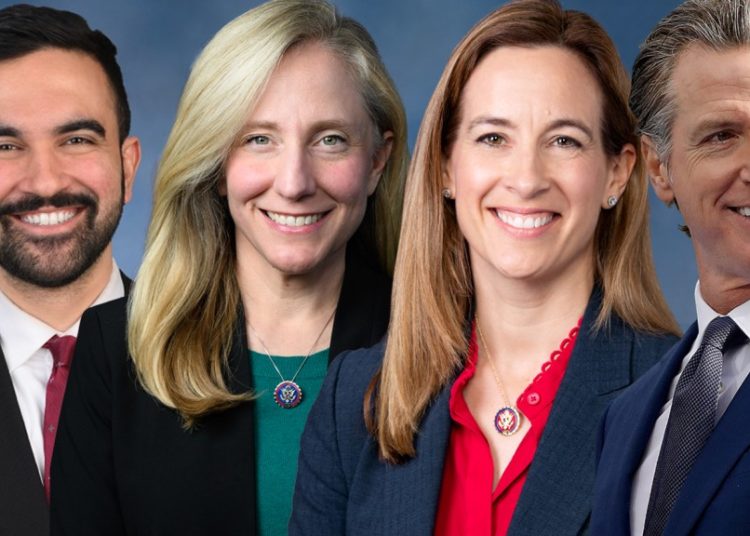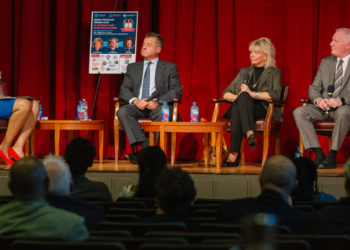Beirut, Lebanon – Pressure on Hezbollah to disarm is intensifying, spearheaded by the United States and backed by some Lebanese factions.
An Israeli war on Lebanon that killed much of the group’s top leadership last year – as well as hundreds of civilians, including at least 200 children – left the group reeling and was compounded by the fall of an ally, Bashar al-Assad’s regime in neighbouring Syria.
Hezbollah’s opponents are now taking advantage of these circumstances.
“It’s clear that Hezbollah has to be disarmed, and it’s clear that Israel is not going to accept terrorists shooting at them into their country,” Deputy US Special Envoy to the Middle East Morgan Ortagus told a Lebanese broadcaster during a visit to the country on April 6.
In another interview, when asked if pushing Hezbollah too hard might lead to internal strife, Ortagus said Hezbollah needed to be treated like “a cancer” and removed.
She also said economic and banking reforms are crucial to stop the cash economy that allows Hezbollah to operate outside the banking network and away from US regulation.
The group is in the most precarious position it has been in since its formation during the Lebanese Civil War.
On the one hand, it’s unlikely to want to disarm without major incentives while on the other, US and domestic pressure is piling up and attacks continue on Lebanon by Israel, which uses “Hezbollah elements” as justification and it has to cooperate so foreign funding can flow into Lebanon for reconstruction.
Hezbollah is still there
Much of the debate over Hezbollah’s arms, however, has not taken into account the group itself or its stance.
Hezbollah has not officially announced it will disarm. But the group is aware that the reconstruction of many of its supporters’ homes relies on the government accessing foreign aid.
Hezbollah wouldn’t accept “to give up its arms de facto out of principle”, Karim Safieddine, a Lebanese political writer and doctoral student in sociology at Pittsburgh University, told Al Jazeera. Instead, they could disarm “in exchange for big benefits”.
The Reuters news agency reported that a senior Hezbollah official had said the group will consider disarming if Israel withdraws from the five points in southern Lebanon it continues to occupy although the group’s media office later denied the report.
“Hezbollah agrees to a national dialogue to develop a defence strategy but won’t discuss disarmament,” said Qassem Kassir, a Lebanese political analyst believed to be close to the group. “Currently, it is impossible to discuss disarmament while the Israeli occupation continues. However, if Israel withdraws, I don’t know what will happen.”
Hezbollah is not the force it was thought to be 18 months ago. A large portion of its arsenal has been destroyed and its military leadership killed during the war with Israel, and its main pathway for receiving weapons was shuttered when al-Assad fled to Moscow in December.
While the group still maintains popular support in large parts of the south, the Lebanese military now largely controls southern Lebanon.
Despite its weakened regional stance, many analysts believe Hezbollah is still capable of challenging any domestic actors, including the military.
“Hezbollah are weakened but still strong in Lebanese terms,” a Western diplomat speaking on the condition of anonymity said. “They cannot frighten or threaten Israel any more but still have enough armaments to pose a threat internally.”
There is a fear in some quarters that, should Hezbollah be pushed into a corner, it could lash out and draw the country into civil strife.
“Yes, the pressure is very great,” Kassir said.
“But I rule out a civil war.”
Pressure on the new government
Before Israel’s war on Lebanon, Hezbollah was the country’s most influential military and political actor.
It drew most of its support from Lebanon’s Shia Muslim community, whose political representation it controlled along with its ally the Amal Movement, reportedly at times using violence against political opponents.
While it still has a lot of popular support in some parts of the country, Hezbollah’s political and military hegemony appears to be over.
“This always happens whenever there is an upheaval, and Hezbollah went through an upheaval,” Hilal Khashan, professor of political science at the American University of Beirut, said.
Domestically, a consensus seems to be forming among powerbrokers that the state must be the sole arbiter of arms, as President Joseph Aoun has repeatedly expressed, in a clear message to Hezbollah.
“The decision has been made, and its implementation will take place through dialogue without any resort to force,” Aoun told Al Jazeera in an interview.
The president seems to have support from French President Emmanuel Macron.
But this measured approach is not universally appreciated, and pressure is building on Aoun and the government of Prime Minister Nawaf Salam from some quarters, particularly the administration of US President Donald Trump, to take a more aggressive approach.
“These forces essentially think [a measured approach] allows Hezbollah to regroup and isn’t tough enough,” Natasha Hall, a senior fellow with the Middle East Program at the Center for Strategic and International Studies, told Al Jazeera.
That view is also shared by some groups in Lebanon, including the Lebanese Forces (LF), a right-wing Christian party that has four ministers in the Salam-led government. The LF’s two top leaders, Samir Geagea and Georges Adwan, have both taken a bullish stance.
Geagea criticised the concept of a national dialogue over Hezbollah’s arms and said a hard deadline of six months should be applied.
Adwan, the LF’s second-in-command, attacked one of Salam’s ministerial allies for saying Hezbollah could not be disarmed by force and disarmament should be incentivised through reconstruction. Adwan also mentioned the possibility of removing the LF ministers from Salam’s government.
That internal pressure by the LF, however, may not have the power or influence to push Hezbollah or the government to act.
“The Lebanese Forces can’t do much but bank on it politically,” Safieddine said.
Washington has the power
As the domestic struggle plays out, experts and analysts said the issue of Hezbollah’s weapons is being decided on other stages: in Washington and the Trump administration’s talks with Iran, a longtime supporter of Hezbollah.
Iran and the US held Oman-mediated talks in Muscat on Saturday and are set for another round in Rome this coming weekend.
While the talks are supposed to focus on Iran’s nuclear programme, experts believe Iran-backed groups in its “axis of resistance” will likely also be on the agenda.
“Iran understands that if they want to continue with a nuclear programme and if it wants to continue to call on the so-called axis of resistance in Lebanon, Yemen and Iraq, the cost will be too high,” Khashan said.
“Hezbollah understands they have to disarm, and it’s going to happen not because of local pressure in Lebanon but because of political will in the US and Israel’s military capabilities,” he continued.
The possibility of Hezbollah disarming seems closer than at any other point in the group’s 40-plus-year history. But some analysts warned that Washington’s approach should consider the delicacy of Lebanon’s current leadership and its attempts to connect with Hezbollah’s traditional support base.
“You have to find a way to create a new sense of social belonging in the Shia community and make people feel the state can represent their interests,” Safieddine said, adding that cross-sectarian social belonging could replace the loyalty to Hezbollah.
“The United States can’t do that,” he said.
For Washington, however, these appear to be unimportant details in grander attempts at reshaping the region. The Trump administration, and the Biden administration before it, have consistently ignored local actors in these attempts.
“Washington feels it can disentangle these various conflicts and pay little attention to governance in these countries and then somehow lead to some kind of sustainable peace,” Hall said.
“For the last year and a half, [we’ve seen] we can’t just circumvent the Palestinian issue, the issue of Lebanese governance and corruption, Yemen, Syria and so on. But it seems there is still an effort to do so.”
The post Will US pressure tactics on Lebanon make Hezbollah disarm faster? appeared first on Al Jazeera.




